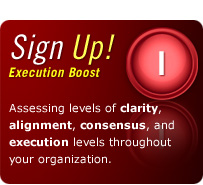Truly appreciating others (instead of simply tolerating or accepting them)
April 1st, 2007
Being able to recognize and truly appreciate (instead of simply tolerating or accepting) others’ differences typically leads to more perspectives and a greater amount of ideas. Many great business leaders and authors talk about what results from this appreciation. From the generation of more solutions to the identification of increased opportunities to succeed, encouraging individuals to continuously be proud of their differences can be a powerful strategy toward a more fully functioning organization.
Thus, the wise leader looks for the utility in differences rather than trying to make everyone more like them. It has been our experience that this practice typically increases energy and motivation in all people involved – and saves the energy that is typically spent trying to change others to be more like “me.” The “be more like me” method of leadership and management usually results in an energy drain in both oneself and in others, while appreciating and utlizing differences can be an incredible energy boost for all.
Click here to read more about Fully Functioning Organizations
Article Filed under: I. WATER (Team/Group Excellence)



4 Comments Add your own
1. Brian Mistler | April 8th, 2007 at 8:31 pm
Amen. I think this is what true multiculturalism means — I hope for this kind of diversity in every organization I’m a part of.
2. Jonathan Branch | December 5th, 2007 at 1:02 pm
People working together is great and is really exciting. But having many different looks at a situation is very helpful. Some of the greatest leaders are not the smartest person on the team, but rather surrounds himself with smart people who are excellent at whatever they do best. I have found that people who use the “be more like me” method of leadership is because they do not feel confident or are too confident that they are the only people that can be correct. A truly excellent leader will listen to all suggestions and ideas, but in the end will choose the best idea whether it is his or another group member’s. I know when I work for a leader who wants things done his way and only his way I get discouraged. Therefore I do not make an effort to do my best, because I know everything I come up with is not good enough. Sometimes even worse than not finishing the project, but I found that people can take not being called on personally. So in the end your employees are non-motivated, and have no drive to do better.
3. Excellence Tree Journal &&hellip | February 20th, 2009 at 11:38 am
[…] Truly appreciating (instead of simply tolerating or accepting) others click here to read more […]
4. Briana de Cola | March 22nd, 2018 at 3:03 pm
This article wins my appreciation! Dr. Higley states a wonderful point that should be admired and practiced by everyone. It is so simple in that, without appreciating or genuinely accepting others, you are completely limiting yourself to new perspectives, life-data, opportunity, and so much more. Why people are not interested in the perspectives of others is beyond me. Do you not ever ask yourself, “Why is [name here] treating me this way?” or “Why is [name here] angry/sad/mad?” The answers to these questions gives you an understanding of why they do what they do or why they feel compelled to use a particular filter to see through. One could argue that appreciation is tantamount to unconditional positive regard. For example, Dr. Higley claims that within a business, appreciation of others generates more solutions and increases opportunities for success. Carl Rogers also supports this idea, while working with clients, “I find that when I am working with clients in distress that to understand the bizarre world of a partially psychotic individual…these understandings somehow enriches me in giving a realization and experience of how other individuals face and meet life” (243). Imagine this idea’s implications outside of the work-force….
The greater take away from this article is the sole purpose of my innate passion for psychology, to understand and appreciate the perspective of others is the only way to help them change (and usually teaches you something about yourself). All too often we shy away from putting ourselves in another’s shoes because of the discomfort, the unfamiliarity, and most commonly the threat to our own perspective/beliefs/tenets. A humbling practice indeed! However, if we are seeking to help others there is just no other way to aid them until we have walked with them in their shoes. This goes for the workforce too; how else can a business grow without an understanding and appreciation for all it’s working parts. Like Dr. Higley states, appreciation is not blind-acceptance consequently, just because you appreciate the shoes of another does not mean you have to like it or agree with it. If someone is highly field-dependent and inexorably believes their social status defines their self-worth…it just is, it is their perspective, it is neither right nor wrong. “The more I am simply willing to understand and accept the realities in myself and in other people, the more change seems to be stirred up” (248). Carl Rogers shows us that instead of changing others to “be more like ‘me’ and to be more accepting and interested in why we are all different is the driving force behind change, positive changes, in the world around us (Dr. Higley).
I love this article because it explicitly explains how difficult it can be to accept others and it sheds lights on the detrimental outcomes of simply tolerating or accepting others. Some humans are ignorant, others are involuntarily oblivious. It takes a lot of questions and passion to appreciate others’ perspectives. No one raised us to believe that reality is always a rainbow. Perhaps the allure is in the vibrant colors and the peaceful milieu. However, when it is raining no one is without an umbrella, as if the rain melts away at our corporeal self. The reality is that it is down pouring and somehow, we go about our day as though there are clear skies, oblivious and uninterested in the heartache of another’s view. After the storm has passed we all look up at the beautiful array of colors that suffuse the sky. We admire the good and the comfortable, crave it, crave financial wealth and bleed for societal acceptance. Yes, these aspects of life are what give us satisfaction when we look up at that rainbow. I think what Higley and Carl Rogers are trying to say is, don’t hide under your umbrella all the time, it is always beneficial to feel the reality of another’s perspective, no matter how cold or uninviting it is.
Kelly, G. A. (2008). Personal Construct Theory and Psychotherapeutic Interview. In M. W. Schustack & H. S. Friedman (Authors), Readings in personality: classic theories and modern research (2nd ed., pp. 241-249). Boston, MA: Pearson/Allyn and Bacon.
Trackback this post | Subscribe to comments RSS Feed
Leave a Comment
Some HTML allowed:
<a href="" title=""> <abbr title=""> <acronym title=""> <b> <blockquote cite=""> <cite> <code> <del datetime=""> <em> <i> <q cite=""> <s> <strike> <strong>